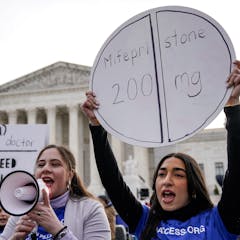
Articles on Abortion
Displaying 1 - 20 of 398 articles

Scholars of communication and politics assess a presidential debate with a clear loser, but no clear winner.

The Supreme Court conceded that it should not have taken up the case to begin with.

A scholar who studies Southern Baptists explains why the denomination’s ultraconservative beliefs about women remain the same.

The 2022 Dobbs decision that overturned 50 years of abortion rights is affecting where young people choose to go to college, to work and to live, as well as the way they vote.

Lawyers, advocacy groups and think tanks are soliciting historians’ expertise on the history underlying certain Supreme Court cases. Yet this history-for-hire approach raises questions.

The opinion did not take on the substance of the plaintiffs’ claims against mifepristone, and the abortion pill is already facing other challenges.

A historian of gender and women’s rights explains how women’s protests focused on their rights evolved from the 1960s through the present.

While anti-abortion rights activists have lobbied politicians to enforce trigger laws in some states, these advocates have not faced opposition in other places.

The new law makes it illegal to possess 2 types of abortion pills without a prescription.

Many Poles were outraged by abortion restrictions put in place during the previous government. That doesn’t mean they agree on the path forward.

Most Americans surveyed did not know how pregnancies are dated or how long a trimester is – but this is especially true among some groups, like people who say they support six-week abortion bans.

Medical workers navigate their own moral and religious beliefs, professional standards, the law and the realities of clinical work – which can be especially complicated in abortion care.

The implications of restrictive laws or near-total bans go well beyond abortions, reducing overall access to prenatal care, birthing services, routine reproductive health care and more.

In Mexico, more states are legalizing abortion at the same time US states like Florida are imposing more restrictions.

Abortions happened in Arizona, despite a near-complete abortion ban enacted in 1864. But people also faced penalties for them, including a female doctor who went to prison.

EMTALA requires hospitals to provide stabilizing treatment to all patients – but Idaho is arguing that its abortion ban means it doesn’t have to allow the procedure, even if it is medically needed.

There are many outdated laws that states keep on the books, even if they aren’t used. If the Supreme Court overturns legal precedents on rights like same-sex and interracial marriage, that can change.

Laws such as Alabama’s controversial ruling that gives personhood rights to frozen embryos will have ripple effects on how advance directives are interpreted by doctors and the courts.

The 1994 Rwanda genocide has left lasting scars. Children born of sexual violence and mothers have shown immense strength in overcoming their histories of violence.

Two legal scholars who study abortion-related laws explain what happened at the Supreme Court in a case that could make it harder to get an abortion.
